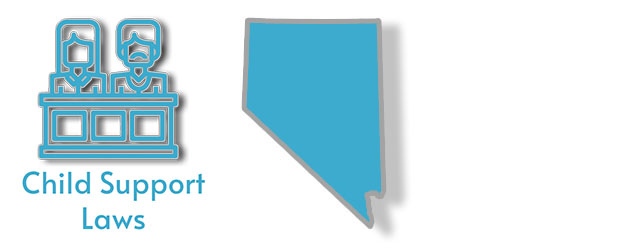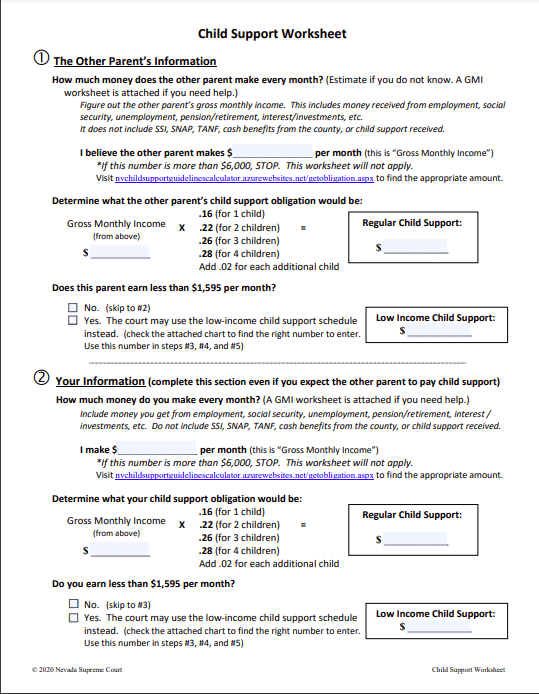
Everything you need to know about Nevada child support laws, updated for 2020.
Nevada child support laws, according to the DWSS, are there to ensure family self-sufficiency by making Child Support a reliable source of income.
The overall idea behind the program is to guarantee financial and medical support for kids in the state.
For parents who are going through a divorce or unplanned pregnancy, you might be worried about the soon-to-be changes in your finances, responsibilities, or what would happen when support becomes a burden.
Below are the vital bits you must know about child support in Nevada.
How to apply for child support in Nevada
To apply for child support in Nevada, either visit the Department of Health and Human Services Division of Welfare and Support Services here, contact a local family court attorney, or call this number (800)992-0900.
The department can also help you to find the non-custodial parent, establish paternity, maintain support orders, and child support order enforcement.
Before we begin, what is important to remember is:
- If you are willing but unable to pay child support, Nevada has programs that can help parents improve their job skills or secure employment.
- Parents who willfully and knowingly fail to pay child support face harsh enforcement actions.
- Enforcement actions are preventable via payment of arrears or petition for modification.
- Parents can apply for child support at local, state, or tribal child support offices.
Revised Nevada child support laws 2020
In 2020, Nevada revised its child support formula. The new changes found in Nevada Revised Statute 125B lays out the rules for calculating upkeep.
What are the new changes?
- Nevada ditched the flat rate formula in favor of a tiered formula based on the income of the non-custodial parent.
- To qualify for a support modification, the parent must show a substantial change in circumstances.
Another change made to NAC 425.140 (Schedule for determining base child support) is that child support now has three categories :
- Parents who earn less than $6000 per month pay 16%.
- Caregivers who make between $6000 and $10000 per month pay 8%.
- Parents who make more than $10000 pay 4%.
What is important to remember is that child support in Nevada is set based on the physical custody order and the parent’s income. But the judge can order a larger or smaller percentage in some cases.
Also, all Child Support Orders in Nevada are set based on Nevada child support guidelines. These guidelines apply the following percentages of parent’s gross income to determine obligation.
- One child: 18%.
- Two children: 25%.
- Three children: 29%.
- Four children: 31%
- Any additional child: 2%.
What is the minimum child support in Nevada?
Nev. Rev. Stat. Ann. 125B.080 (4) says that minimum child support in Nevada is $100.
How is child support calculated in Nevada as per new upkeep orders?
In estimating child support in Nevada, the court uses the linked worksheet below.

Page 1: Nevada child support worksheet
Download Nevada Child Support Worksheet here.
In the worksheet, you will notice a Low-Income Child support Schedule for parents who earn less than 1,595.
The idea is to use the worksheet to establish an estimate. However, the results depend on your input.
How is child support established in Nevada?
Note that both parents in Nevada must cover the costs of raising a child. These costs include education expenses, healthcare, and so on. Also, the percentages of gross monthly income required for child support changes annually.
That said.
The factors considered when awarding child support include:
- Any special educational needs of the child.
- The parent’s ability to pay.
- The legal responsibility of the parties for the support order.
- Relative income of both households.
What to remember:
- If the parents share joint or split custody, the higher-earning parent pays support.
- The best interests of a child(ren) dictate your support order.
How to change child support order in Nevada
As your child grows, his or her needs change. On top of that, your needs also change. Accordingly, Nevada child support guidelines allow parents to petition for changes if the order is unfair or not in the best interest of the child.
But remember, there must be a substantial or continuing change in financial circumstances to win modification. What do I mean?
First, under Nevada Child Support Guidelines, parents can petition for modification every three years. Second, to win order changes before three years have subsided. You must show the court at least a 20% change in your gross monthly income.
What does the judge consider when awarding modification?
- The age and cost of raising a child in the state.
- Each parent’s contribution value.
- The cost of transportation for visitation.
- Each parent’s relative income.
- Any Public assistance received by either parent.
The list above is not complete, so consult with a family court attorney in your area.
How to modify child support in Nevada
To begin the modification process, either contact your local child support offices or call (775) 648-7200 if you are in northern Nevada or (702) 486-1646 for parents in southern Nevada.
What to remember
- Incarceration may constitute voluntary unemployment.
- There is no law preventing incarcerated parents from petitioning for modification.
- The review process may take up to 180 days.
- Out of court agreements are legal if notarized and approved by the court.
Download all modification forms and instructions here.
What happens if you do not pay child support in Nevada?
Nevada Child Support Enforcement (CSE) offices exist to help parents in the state establish and collect upkeep. The tools this agency uses are:
- Income withholding: the CSE can use income withholding orders to collect payments from your unemployment benefits, salaries, wages, veterans and social security benefits, military support, and all other applicable forms of parental income.
- License suspension: through the DMV, the CSE can suspend your driver’s license. It may also deny, suspend, or revoke your professional or recreational permit.
- State, local, and federal tax return interception is an option for the CSE.
- Credit bureau reporting: this action will impact your credit score and finances, including your mortgage.
- Bank account garnishment.
- Contempt of court charges.
When does non-support become a felony in Nevada?
In Nevada, you commit a category C felony if you violate a child support order for a second or third time. What that means is, if you owe more than $5000 in back child support, you will face misdemeanor charges. Misdemeanor non-support charges carry a six-month jail sentence or a $1000 fine.
The punishment for a class C felony is a maximum sentence of five years or a $10000 fine.
It is also worth noting that the delinquent parent may also face federal charges if the child is in another state. So, if you are facing non-support charges, either settle your obligation, petition for modification, or establish a payment plan with your former partner.
What to remember:
- The state must show that non-payment was willful.
- Receiving parents cannot deny parenting time for non-payment.
- Incarcerated parents can petition for modification.
How long does child support last in Nevada?
The age of emancipation in Nevada is 18. However, child support continues until the child finishes high school. Thus, if the child is 19 and still in high school, your obligation will end when the child graduates.
If the child is mentally or physically disabled, Payments may continue indefinitely depending on your child support order.
Emancipation: a way out for kids
Children from a dysfunctional family or ones seeking independence from their parents can petition local courts for emancipation.
To qualify for emancipation in Nevada. The courts require parental/guardian consent, proof that the minor can support him/herself (financially), and the child must show that he or she is mature enough to handle adult responsibilities.
Also, show that emancipation is in your best interests.
After emancipation, the law will see you as an adult but without privileges such as gambling or alcohol consumption.
Download forms by county here.
What about voluntary termination of parental rights?
Voluntary termination of parental rights only happens in Nevada if the court deems it to be in the best interests of the child. That means a court will only terminate parental rights if:
- The parent abandons the child.
- The parent/s are unfit to raise the child (drug abuse, neglect, and so on).
- When the child is at risk of physical or emotional damage.
However, in 1995, the Nevada legislature added a provision that allows parents in the state to set aside parental rights and free up the child for adoption.
Download all related forms here.
Overall, Nevada child support guidelines are not easy to navigate on your own. So, we recommend that you consult with or work with a family court attorney in your area.
More Nevada Laws